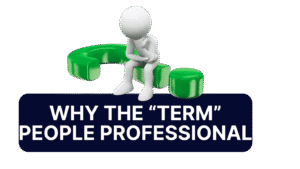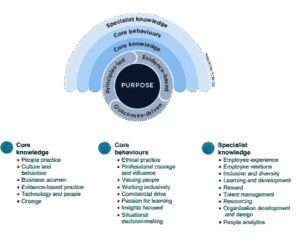
For a long time many individuals and organisations have understood Human Resources to be the main role that focuses on matters related to employees. Therefore, while the role continues to evolve and is slowly adopting the name ‘people professionals’ this term is still quite unfamiliar to many individuals both within and outside the field of HR. Numerous sentiments have risen disregarding the use of the term ‘people professional’ with some arguing that Human Resources are the least attached to people with many of their roles requiring them to work on their own or within small teams rather that the entire organisation all together. Furthermore, they are mainly focused on policies, hiring, training and regulations rather than dealing with the people themselves.
Hence, the purpose of this article is to appraise what it means to be a people professional and why the term “a People Professional” is relevant especially in today modern workplace.

The term People Professional?
Many individuals explain the people professional as a synonym of Human resources. However it is important to note that these two while they may be related, they are not quite the same thing. While Human Resources (HR) remains a vital part of any business, it is increasingly adopting the term ‘The People Profession’, reflecting its evolving role in the workplace. People professional is more of an umbrella term covering all the currently existing roles in an organisation that deal with the human capital. The main idea is that these roles are mainly focused on the people within the organisation e.g. employees, management, customers, and the surrounding communities. Some of the roles/ specialisations under people profession include, HR Generalist, Employee Relations, HR Business Partner, Inclusion and Diversity, Learning and Development (L&D), organisation Development and Design (OD&D), People Analytics, People Consultant and Resourcing as highlighted in the CIPD professional map specialist knowledge.
A people professional is more than just HR, it entails more than just hiring, firing or tending to legal matters. It exists because people are the most valuable asset within any organisation. It acknowledges their impact, contributions, and overall value in achieving business objectives. Having specialist areas allows all stakeholders to be considered in the shaping and decision-making of the policies that influence the day to day running of the organisation. What do employees need? What does the management need? Are our customers fully satisfied and how is this influenced by the people within? How does the organisation impact the community around and is the organisation heading towards its goals and is everyone on board? These are some of the questions that people professionals aim to answer and solve.
As a result, they prioritise the comprehensive development and management of employees while shaping people practices that influence their work experience. They strive to address individual needs, fostering a positive workplace environment and ensuring employees receive beneficial support and rewards. The people professionals’ environment is dynamic and constantly adapting to internal and external changes in the world around us. Thus moving from HR to people professional is an evolution aimed to create roles that are adaptive to the demands being placed upon them. This means with the evolving technology, changes in organisational structures, changes in legislations, adaptation of various tools like reward and well-being, different roles must exist so that all these areas are addressed without neglecting one.
The specialist roles directly reflect on the skills and knowledge that people professionals must gain. This is evident from the CIPD professional map that lists these roles as the specialist knowledge. The specialist knowledge areas show people professionals how to apply their expertise to make a positive impact including • Employee experience • Employee relations • Equality, diversity and inclusion • Learning and development • Reward • People analytics • Organisation development and design • Resourcing • Talent management • Wellbeing.
These specialist knowledge are supported by core knowledge and core behaviours. Core knowledge encompasses fundamental concepts and principles that all people professionals must grasp, regardless of their role, specialization, industry, or level of experience. For instance as a people professional having knowledge on Business acumen is important in ensuring that people practice initiatives are not just “nice to have” but strategically impactful. It empowers them to speak the language of the business, make data-driven decisions, and contribute to sustainable performance, some of the key expectations under the CIPD’s core knowledge framework. Consider the example below;
Imagine a people professional working in a retail company experiencing declining profit margins due to rising operational costs and changing consumer behavior. By applying business acumen the people professional understands the financial pressures, the competitive landscape, and how workforce productivity and customer service directly impact revenue.
Instead of proposing generic training programs, the people professional collaborates with finance and operations to analyze customer satisfaction data, sales performance, and employee engagement metrics. They identify that frontline staff turnover is high, leading to poor customer service and lost sales. Using this insight, the people professional develops a targeted retention and development strategy that includes coaching for customer service skills, incentives for performance, and streamlined onboarding. Within six months, staff turnover drops by 20%, customer satisfaction improves, and quarterly sales figures begin to rise.
Core behaviours represent the professional standards that uphold CIPD’s key values. Like core knowledge, they apply to all professionals, regardless of their role, career stage, or industry. These can basically be termed as the values people professionals uphold as they perform their roles enabling them to push their people agenda as professionals. These include ethical practice, professional influence and courage, valuing people, working inclusively among others (see image below). These behaviours empower HR practitioners to remain effective, credible, and forward-thinking driving meaningful change within their organisations. With core behaviours, they do not merely support the business; they shape it challenging assumptions, inspiring leaders, and ensuring that people practices are both ethical and impactful. These core behaviours are not optional, they are essential for building credibility, fostering trust, and making a measurable difference in the modern workplace.

The CIPD Professional Map Explained: A Complete Guide for HR Professionals
Generally, a “People Professional” is someone who understands the human factor and how to effectively communicate with people. They are skilled in problem-solving, collaborate well and have a deep understanding of people. The skillset of a people professional applies to all aspects of life. This includes managing a team, building relationships with family and co-workers, conducting business negotiations, and finding a new hire or promotion. All People Professionals have one thing in common: their ability to communicate and connect with others effectively. This does not mean they are simply friendly or likable, or that they possess extensive knowledge about people. Instead, they possess the core knowledge defined as a foundational understanding of people management principles and core behaviors such as active listening, empathy, and adaptability needed to guide and effectively manage people.
To put it simply, people professionals are a group of specialists who focus on different aspects that affect individuals within an organisation. Like members of a superhero team, each brings important skills and knowledge to their specialized area. Together, they are guided by shared values and behaviours that define them as professionals.